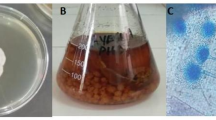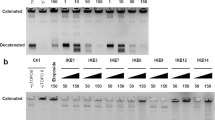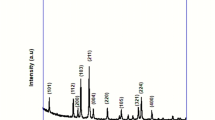Abstract
IN the course of our studies on methods of synthesis of thiazole derivatives and their possible useful applications, it appeared of interest to examine their fungicidal properties, since these contain in a cyclic ring structure the grouping N—C—S which is present in known fungicides like tetramethyl thiuram disulphide, thioureas and thioacetamide. Some new mercurated derivatives of thiazoles have also been prepared by us, and since mercury is a powerful fungicidal element, phenyl mercuric acetate being actually used for such diseases as apple scab, it was considered worth while to test these mercurated thiazoles for their fungicidal action.
This is a preview of subscription content, access via your institution
Access options
Subscribe to this journal
Receive 51 print issues and online access
$199.00 per year
only $3.90 per issue
Buy this article
- Purchase on SpringerLink
- Instant access to the full article PDF.
USD 39.95
Prices may be subject to local taxes which are calculated during checkout
Similar content being viewed by others
References
Pujari, H. K., and Rout, M. K., J. Amer. Chem. Soc., 75, 4057 (1953).
Pujari, H. K., and Rout, M. K., J. Ind. Chem. Soc., 31, 257 (1954).
Montgomery and Moore, J. Pomol. and Hort. Sci., 15, 253 (1938).
Author information
Authors and Affiliations
Rights and permissions
About this article
Cite this article
ROUT, M., PADHI, B. & DAS, N. Use of Mercurated Thiazoles as Fungistatic Agents. Nature 174, 516 (1954). https://doi.org/10.1038/174516a0
Issue date:
DOI: https://doi.org/10.1038/174516a0



